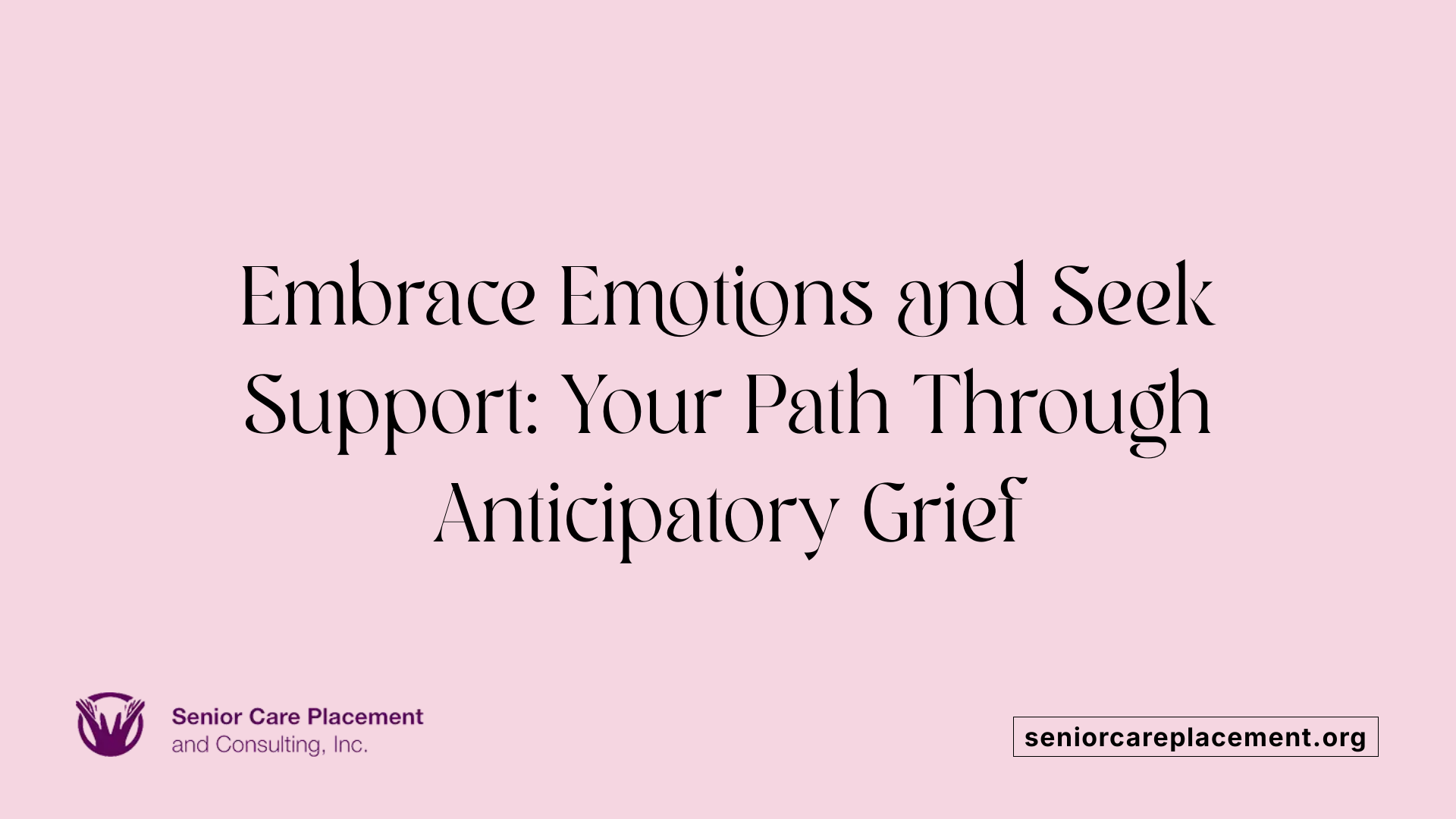How to Cope with Grief After a Loved One Enters Hospice Care
Navigating Loss with Compassion and Support

Understanding and Managing Grief During Hospice Care
Learning to cope with the emotional challenge of losing a loved one is a profound journey that begins even before their passing, especially when they are in hospice care. Recognizing the phases of anticipatory grief, understanding the hospice support services, and preparing for meaningful conversations can make this difficult time more manageable. This article explores comprehensive strategies to help families and caregivers navigate grief, support their loved ones, and find solace amid loss.
Understanding Anticipatory Grief and Its Symptoms

What are anticipatory grief and its symptoms?
Anticipatory grief is a natural emotional and psychological response that occurs before the actual loss of a loved one, usually during a serious or terminal illness. It allows individuals to mourn and prepare themselves emotionally for the impending death.
Common symptoms include intense feelings such as sadness, anger, worry, and hopelessness. People may also experience guilt, frustration, and detachment or numbness. Alongside emotional reactions, physical symptoms like difficulty sleeping, loss of appetite, fatigue, and mood swings are common.
Cognitive reactions often involve preoccupations with thoughts about the future without the loved one, preoccupations with death, and repetitive thoughts. These symptoms can fluctuate in intensity and may come and go as circumstances change.
Recognizing these signs as normal helps individuals understand their emotional process. Seeking support through counseling, support groups, or talking openly with loved ones can aid in coping with anticipatory grief. Proper acknowledgment of these feelings prepares individuals emotionally, making the eventual loss easier to process.
Strategies to Cope with Anticipatory Grief

How can I cope with anticipatory grief?
Coping with anticipatory grief involves embracing and expressing the wide spectrum of emotions that come with an impending loss. It’s normal to feel sadness, anger, guilt, anxiety, and even relief. Allow yourself to experience these feelings without self-judgment, which is an important step towards emotional healing.
Connecting with supportive individuals—whether friends, family, or mental health professionals—provides an essential outlet for sharing your thoughts and feelings. Talking openly about your fears, frustrations, or hopes can lessen feelings of isolation and help clarify your emotions.
Practicing self-care is vital. This includes maintaining a healthy diet, engaging in regular exercise, ensuring rest, and practicing relaxation techniques like deep breathing or meditation. Spending quality time with your loved one, and doing activities that bring you comfort, can also foster resilience.
Sharing emotions through journaling, participating in support groups, or engaging in heartfelt conversations can be therapeutic. These activities serve as outlets for processing grief and gaining different perspectives.
Creating memories—such as making photo albums, recording stories, or simply sharing peaceful moments—helps preserve the bond and provides solace.
Addressing practical matters early, like discussing legal and financial arrangements, can also lessen stress during this emotional period.
Seeking professional guidance, such as grief counseling or therapy, can provide tools and strategies tailored to your unique experience.
Remember, each person's journey through anticipatory grief is different. Small, manageable steps—combined with support and self-compassion—can make this difficult time more bearable.
What Is Hospice Care and How It Supports Grieving Families

What is hospice care and how does it help in coping with loss?
Hospice care is a specialized form of support designed for terminally ill patients nearing the end of life and their families. Its primary focus is on providing comfort, dignity, and quality of life by managing symptoms and alleviating pain. Hospice teams consist of various professionals who coordinate to meet physical, emotional, spiritual, and practical needs.
This comprehensive approach helps families navigate the difficult journey of loss by offering counseling and ongoing grief support. These services include access to support groups where families can share experiences and find encouragement, reducing feelings of isolation. Hospice also emphasizes addressing emotional and spiritual concerns, facilitating acceptance, and fostering peace through activities like meditation, music therapy, and spiritual guidance.
Ongoing bereavement support typically continues for months after the loved one’s passing. This long-term assistance helps family members process complex feelings such as sadness, guilt, and relief, aiding their emotional resilience. By providing tools for coping and fostering meaningful memories, hospice guides families through anticipatory grief and helps them find healing.
In essence, hospice care is not only about supporting comfort in the final days but also about helping families manage grief during and after the loss, ensuring they are supported every step of the way.
The Impact of Anticipatory Grief on the Overall Grieving Process
Variable effects of anticipatory grief
Anticipatory grief is a complex emotional process that occurs before the actual loss, often experienced when caring for a loved one with a terminal illness. For some individuals, it can serve as a valuable preparation tool, helping them emotionally brace for the impending death.
This type of grief might manifest through feelings of sadness, anxiety, anger, or guilt, and can influence how a person copes with subsequent mourning. While some find that addressing these emotions ahead of time softens the shock of loss, others might find it overwhelming or emotionally draining.
Preparation and acceptance benefits
Engaging with anticipatory grief offers opportunities for mental, spiritual, and emotional preparation. Conversations about wishes, goodbyes, and end-of-life preferences can foster a sense of control and acceptance.
Support from hospice care providers, family, and counseling can facilitate this process. It also allows loved ones to create memories, say important words, and support each other through shared experiences, which can be emotionally comforting.
Possible complications and prolonged grief
Despite its potential benefits, anticipatory grief can lead to complications such as prolonged grief disorder (PGD), where grief persists intensely and interferes with daily life. In some cases, initial mourning may become complicated by feelings of helplessness or ongoing anxiety about the future.
If not properly managed, anticipatory grief might cause emotional exhaustion or even lead to delayed grief reactions after the loss. Recognizing signs of complicated grief and seeking professional support are vital steps in addressing these challenges.
Importance of support and communication
Effective communication and social support are crucial in shaping the experience of anticipatory grief. Openly talking about fears, hopes, and feelings with family, friends, or counselors can reduce feelings of isolation.
Hospice services and support groups offer a safe environment to express emotions and gather coping strategies. Maintaining these connections can ease emotional burdens and enhance resilience during this difficult time.
In summary, anticipatory grief can have both positive and negative effects on the grieving process. Its impact largely depends on individual coping mechanisms, available support, and the ability to communicate feelings openly. Proactive engagement with support systems and acceptance can help manage the journey through grief more effectively.
Supporting Someone Through Active Dying and During Bereavement
How can I support someone in hospice and during active dying?
Supporting someone in hospice or during the active dying phase involves multiple dimensions of care that focus on comfort, connection, and dignity. Providing physical relief is fundamental. This includes managing pain with medications, keeping the person comfortable through gentle touch, and creating a soothing environment with dim lighting, soft music, and minimal noise. These measures help ease physical discomfort and promote relaxation.
Equally important is meaningful communication. Listening attentively and engaging in conversations that honor their life and feelings can be profoundly comforting. Sharing memories, expressing love, reassurance, and forgiveness can strengthen emotional bonds during this delicate time. Respecting their wishes about interactions—whether they want company, silence, or specific activities—is essential.
Offering emotional and spiritual support can further enhance their sense of peace. This might involve holding space through presence, prayer, meditation, or simply sitting quietly together. Addressing spiritual needs, if applicable, and offering reassurance based on their faith or personal beliefs can provide deep comfort.
Practical support plays a critical role too. Assisting with personal hygiene, helping manage symptoms, and supporting family members both emotionally and logistically ensure that overall needs are met. Recognizing signs of immediate decline, such as changes in consciousness or breathing patterns, allows caregivers to respond compassionately, maintaining the patient’s dignity and comfort.
Throughout this journey, the caregiver’s awareness of the person's cues and maintaining a focus on their desires and dignity are vital. Compassionate care—combining physical comfort, emotional presence, and spiritual understanding—helps honor the person's life and eases the passage, making their final moments as peaceful as possible.
Facilitating End-of-Life Conversations and Planning
 When it comes to discussing end-of-life care, timing and approach are crucial. Initiating these conversations early in the course of illness provides space for patients and families to express wishes and concerns before emotions become overwhelming. Healthcare providers often use structured tools, such as the Serious Illness Conversation Guide, to facilitate meaningful and respectful dialogue. This approach encourages honesty, clarity, and understanding about options like hospice, palliative care, and advanced directives.
When it comes to discussing end-of-life care, timing and approach are crucial. Initiating these conversations early in the course of illness provides space for patients and families to express wishes and concerns before emotions become overwhelming. Healthcare providers often use structured tools, such as the Serious Illness Conversation Guide, to facilitate meaningful and respectful dialogue. This approach encourages honesty, clarity, and understanding about options like hospice, palliative care, and advanced directives.
Addressing emotional, psychosocial, spiritual, and practical concerns is essential. Patients and families may experience a range of feelings, from fear and sadness to hope and relief. Open conversations help surface these emotions, allowing healthcare professionals and loved ones to provide reassurance and support. Spiritual concerns might involve seeking peace, purpose, or reconciliation, while practical issues include legal documents, care preferences, and logistical planning.
Involving family members and clinicians in these discussions ensures a holistic approach. Family members can offer insights into the patient’s preferences and provide emotional support, while clinicians can clarify medical options and guide decision-making. Encouraging caregivers to ask questions, express fears, and share memories can ease anxiety.
To ensure wishes are known and respected, documenting preferences through advance directives, living wills, and healthcare powers of attorney is vital. These legal tools guide caregivers and clinicians in honoring the patient's choices. Regular review and updates of these documents can prevent misunderstandings.
Preparing for these conversations involves education and training. Clinicians need skills in culturally sensitive communication and handling difficult topics with empathy. Support from mental health professionals and grief counselors can also empower families to navigate complex emotions.
Ultimately, honest and compassionate dialogue about end-of-life preferences ensures that care aligns with the patient's values, promotes dignity, and supports emotional well-being for both the patient and their loved ones.
What to Say and Do During End-of-Life and Grieving Moments
Providing empathetic presence
During end-of-life and grieving periods, being physically and emotionally present for loved ones is crucial. This involves active listening, gently holding their hand, and offering words of reassurance. Respect their wishes and cultural practices, as these can provide comfort and dignity. Avoid rushing the conversation; instead, give space for silence and reflection.
Sharing memories and emotions
Encourage sharing meaningful memories and stories about the loved one. These moments of connection can be healing for both the patient and family members. Openly discussing feelings like sadness, anger, or guilt helps in processing grief. Validating emotions creates a supportive atmosphere where expressing vulnerability is welcomed.
Physical comforts and environment
Create a peaceful and calming environment by adjusting lighting with dim lights, playing soft music, and ensuring the person’s physical comfort. Simple acts such as keeping the mouth moist, maintaining proper hygiene, and using gentle touches can alleviate discomfort. Minimizing noise and distractions helps the individual process their final moments with serenity.
Acknowledging feelings and spiritual needs
Recognize and validate the variety of emotions experienced during this time. Offering spiritual support or guidance, if desired, can provide additional reassurance. Respect individual beliefs and preferences, and consider involving spiritual leaders or chaplains to support spiritual needs.
Self-care for caregivers
Caring for a loved one at this stage can be emotionally and physically draining. It’s essential for caregivers to take breaks, eat healthily, and seek support as needed. Joining hospice support groups or talking with professionals can help manage stress and prevent burnout. Prioritizing personal well-being ensures caregivers can provide ongoing compassionate care.
Supporting someone through end-of-life and grief involves compassion, patience, and genuine connection. By fostering a caring environment and honoring emotional and physical needs, families can find strength and comfort during these profound moments.
Supporting Long-Term Grief and Finding Resources for Healing

What resources are available for long-term grief support and bereavement?
Coping with grief, especially over the long term, can be a challenging journey. Fortunately, numerous resources are available to aid individuals in their healing process. Professional counseling services, provided by licensed therapists and mental health organizations, can offer personalized support tailored to each person's unique experience.
Support groups are another vital resource. Organizations like GriefShare and the SADS Foundation host regular meetings, both in person and virtually, where people share their stories and receive mutual support. These groups help individuals feel understood and less isolated.
Educational materials, such as books, articles, and online guides, are also helpful. Topics often include coping strategies, understanding grief stages, and managing complicated grief. Prominent websites like dougy.org, missfoundation.org, opentohope.com, and prolongedgrief.columbia.edu provide a wealth of information, community forums, and downloadable resources to guide people through their mourning.
Mental health organizations such as SAMHSA and local departments of mental health offer crisis helplines, referrals, and ongoing support services. These resources are crucial for emergency assistance or when grief becomes overwhelming.
Locally, hospitals, hospice centers, and places of worship often organize bereavement groups and workshops. Many communities now offer virtual video support options, making assistance accessible regardless of location.
Remember, grief can last for years, and seeking support is a sign of strength. Access to diverse resources helps individuals process emotions, find comfort, and move forward in their healing journey.
Embracing Support and Ongoing Healing
Coping with grief after a loved one's entry into hospice care is an intricate and deeply personal process. Recognizing the emotional stages, seeking and utilizing hospice services, and fostering open, honest communication can create pathways toward acceptance and peace. Remember, compassion—for yourself and others—and seeking support from professional counseling, support groups, and community resources are vital. While grief may persist over time, understanding that it is a natural, evolving journey can help individuals find comfort, resilience, and hope for the future. Embracing support and self-care ultimately allows healing to take root even amidst profound loss.
References
- Anticipatory Grief: Understanding Grief Before a Death
- Hospice Grief and Loss: Understanding the Stages of Grief
- Coping with Grief: Hospice Care and Beyond - Valir Health
- Coping Tips for When Your Family Member Is in Hospice - Amedisys
- Coping with Grief and Loss: Stages of Grief and How to Heal
- Managing Stress When Your Loved One is Under Hospice Care
- Coping With Grief and Loss | National Institute on Aging
- Understanding Anticipatory Grief: Navigating Emotions in Hospice ...
- Preparing for the Loss of a Loved One
- What to Say When Someone is Dying: Comforting Words & Gestures






































































































